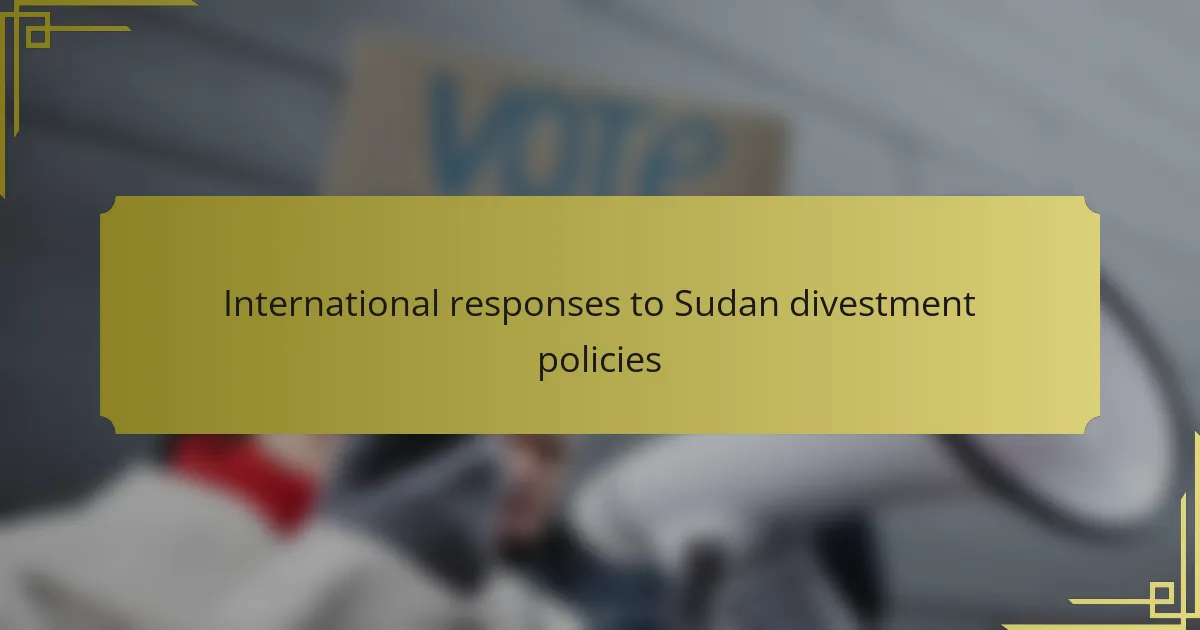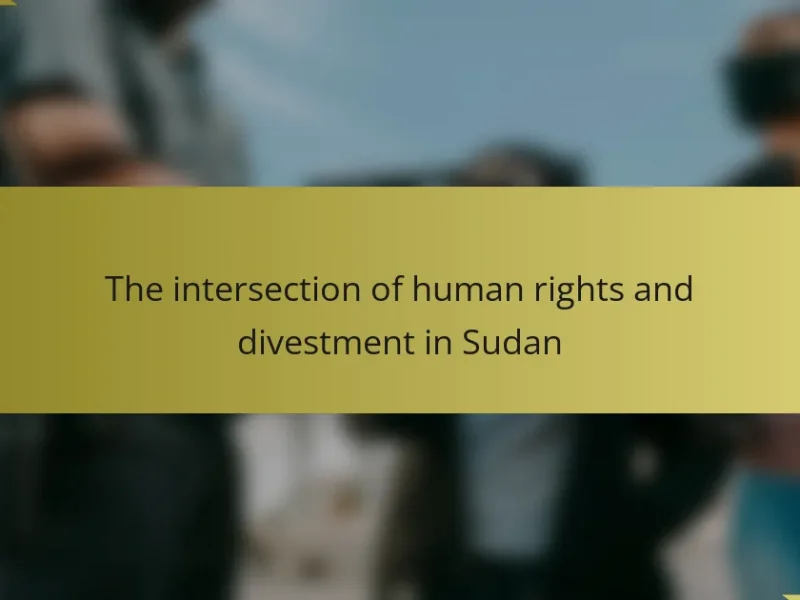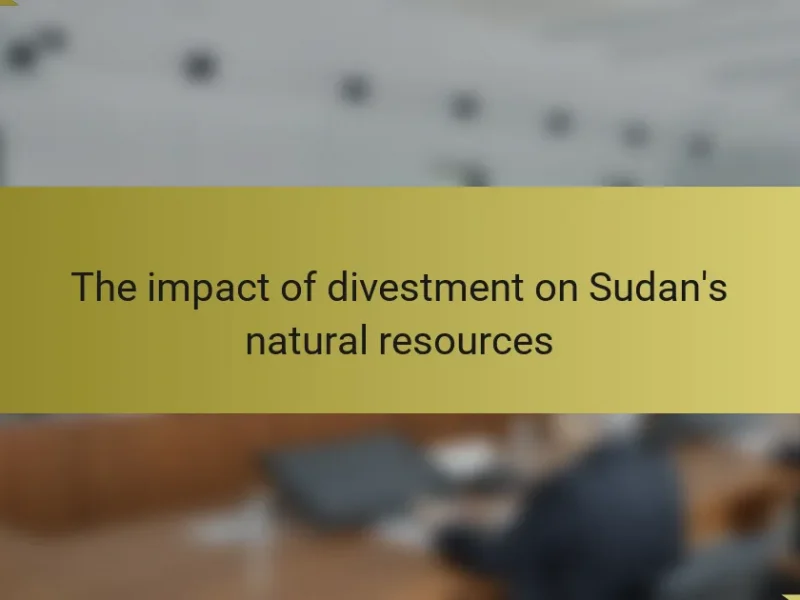Sudan divestment policies are strategies employed by governments and organizations to withdraw investments from companies operating in Sudan, primarily in response to human rights abuses. Originating in the early 2000s amid the Darfur conflict, these policies aim to pressure the Sudanese government to improve its human rights record. International responses to these divestment efforts include economic sanctions, advocacy for divestment, and diplomatic pressure from entities like the United Nations. The impact of these actions has led to significant economic consequences for Sudan, including reduced foreign direct investment, job losses, and increased economic instability, ultimately affecting the livelihood of the Sudanese population.
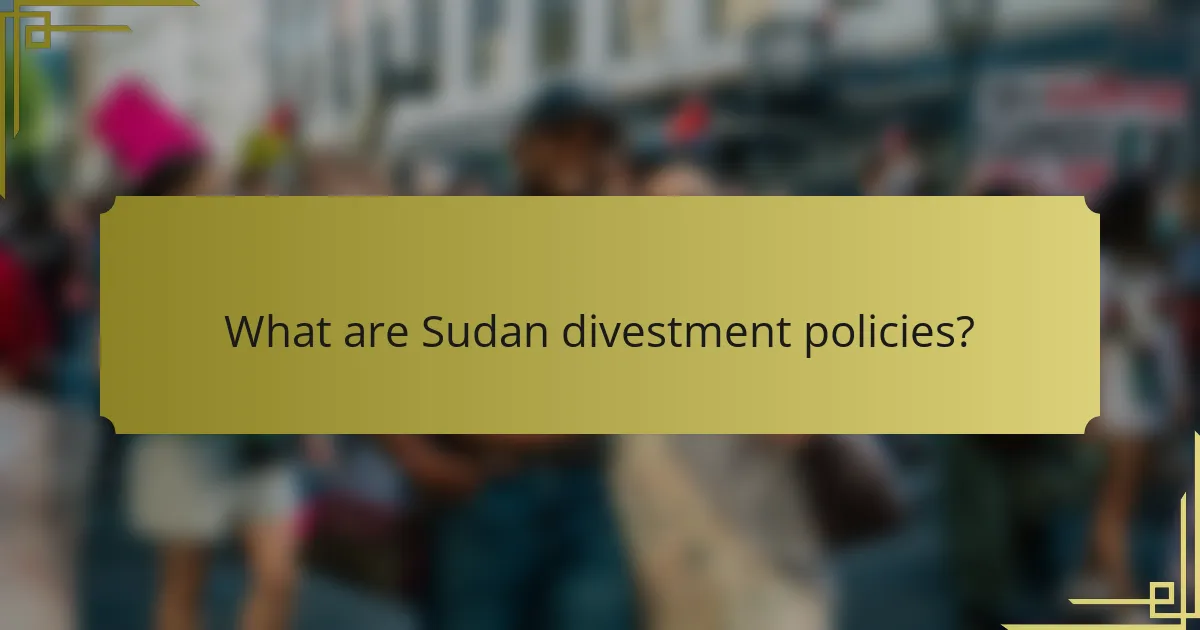
What are Sudan divestment policies?
Sudan divestment policies are measures aimed at withdrawing investments from companies operating in Sudan. These policies are often implemented by governments and organizations to protest against human rights abuses. The divestment movement gained momentum in the early 2000s, particularly in response to the Darfur conflict. Many states in the U.S. adopted legislation to encourage divestment from Sudanese companies. The aim is to pressure the Sudanese government to change its policies and improve human rights conditions. Research indicates that divestment can impact a nation’s economy by reducing foreign investment. For example, a 2007 report by the U.S. Government Accountability Office highlighted the financial implications of divestment actions.
How do Sudan divestment policies impact international relations?
Sudan divestment policies significantly influence international relations by altering diplomatic and economic engagements. These policies often lead to sanctions and reduced foreign investment in Sudan. Consequently, nations that support divestment may strengthen ties with other countries advocating for human rights. For instance, the divestment movement was largely driven by concerns over human rights violations in Darfur. This has prompted international organizations to reevaluate their partnerships with Sudan. Additionally, countries that divest may experience increased domestic support from human rights advocates. Overall, these policies create a complex web of alliances and tensions in global diplomacy.
What are the historical contexts of Sudan divestment policies?
Sudan divestment policies emerged in response to human rights violations and conflicts in the region. The Darfur genocide, which began in 2003, prompted international outrage and calls for action. In 2007, the U.S. government implemented divestment measures targeting companies supporting the Sudanese government. Various U.S. states and universities followed suit, enacting their own divestment policies. These actions aimed to pressure the Sudanese government to cease human rights abuses. Additionally, the divestment movement gained traction among activists and humanitarian organizations. The policies were part of broader international efforts to address the humanitarian crisis in Sudan.
What are the main objectives of these policies?
The main objectives of these policies are to promote human rights and support peace in Sudan. They aim to pressure the Sudanese government to end human rights abuses. Additionally, these policies seek to encourage economic reforms in Sudan. They also intend to protect investments from companies involved in unethical practices. By divesting, international entities aim to signal disapproval of the government’s actions. This approach is designed to foster accountability and encourage positive changes within the country. Ultimately, the policies aim to contribute to stability and development in Sudan.
Why are international responses to Sudan divestment policies significant?
International responses to Sudan divestment policies are significant because they can influence economic conditions in Sudan. Divestment aims to pressure the Sudanese government to change its policies. When countries or organizations withdraw investments, it can lead to reduced funding for government operations. This can impact human rights and conflict situations in the country. For example, the divestment movement gained momentum after reports of human rights abuses in Darfur. Additionally, international responses can create a collective stance against oppressive regimes. This can encourage other nations to join in similar actions. Ultimately, these responses can help shape Sudan’s political landscape and promote accountability.
How do these responses reflect global attitudes towards Sudan?
Global responses to Sudan reflect a complex mix of concern and skepticism. Many nations express concern over human rights violations in Sudan. This concern highlights a global commitment to humanitarian values. Additionally, some responses indicate skepticism about the effectiveness of divestment policies. Critics argue that such measures may not lead to significant change. This skepticism showcases a lack of confidence in international intervention. Furthermore, responses often reveal geopolitical interests influencing attitudes towards Sudan. Countries may prioritize strategic alliances over human rights issues. Overall, these responses illustrate a nuanced global perspective on Sudan, balancing humanitarian concerns with political realities.
What role does international law play in these responses?
International law plays a crucial role in shaping responses to Sudan divestment policies. It provides a framework for states and organizations to act against human rights violations and promote accountability. International treaties, such as the International Covenant on Civil and Political Rights, guide nations in their decisions regarding sanctions and divestment. Furthermore, the United Nations Security Council resolutions can mandate actions against Sudan, influencing international responses. Legal principles also ensure that divestment actions are consistent with obligations under international humanitarian law. These legal frameworks facilitate coordinated efforts among countries to address the humanitarian crisis in Sudan.
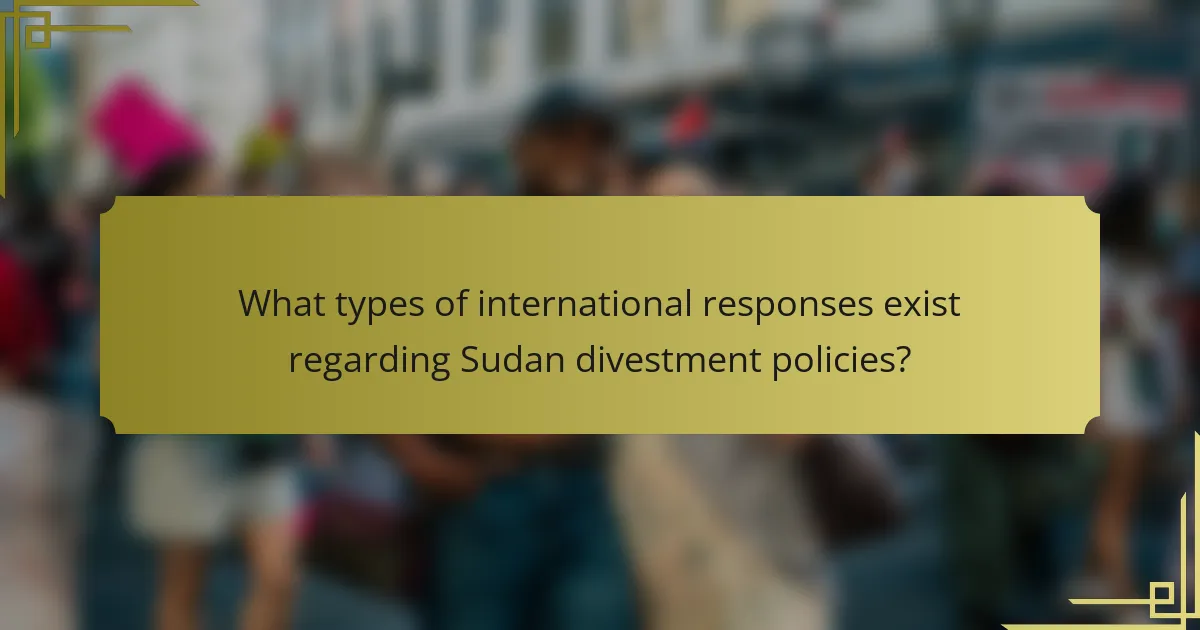
What types of international responses exist regarding Sudan divestment policies?
International responses to Sudan divestment policies include economic sanctions, advocacy for divestment, and diplomatic pressure. Economic sanctions have been imposed by countries such as the United States, targeting specific sectors like oil and arms. Advocacy for divestment has been led by organizations urging investors to withdraw from companies operating in Sudan. Diplomatic pressure involves negotiations and resolutions from international bodies like the United Nations. These responses aim to influence Sudan’s government regarding human rights and conflict issues. The effectiveness of these measures varies, with ongoing debates about their impact on the situation in Sudan.
How do different countries respond to Sudan divestment policies?
Different countries respond to Sudan divestment policies through various actions and statements. The United States has implemented sanctions targeting specific sectors in Sudan. European nations often align their policies with U.S. sanctions but may have differing levels of enforcement. Countries in the African Union have expressed support for Sudan’s sovereignty while advocating for economic engagement. China maintains investments in Sudan, prioritizing economic interests over divestment. Some Middle Eastern nations continue financial support, viewing Sudan as a strategic partner. Overall, responses vary based on geopolitical interests and economic relationships with Sudan.
What are the specific actions taken by the United States?
The specific actions taken by the United States regarding Sudan divestment policies include the implementation of economic sanctions. These sanctions target individuals and entities involved in human rights violations. The U.S. has also encouraged American companies to divest from Sudan. Legislative measures, such as the Sudan Accountability and Divestment Act, were enacted to facilitate this process. The U.S. government has coordinated with international partners to promote similar divestment efforts. Additionally, the State Department has issued reports on human rights conditions in Sudan. These actions aim to pressure the Sudanese government to change its policies and improve human rights.
How do European nations approach Sudan divestment?
European nations generally approach Sudan divestment through a combination of regulatory measures and ethical investment strategies. Countries like Norway and Denmark have implemented policies that discourage investment in sectors linked to human rights abuses. The European Union has also placed sanctions on specific individuals and entities in Sudan, affecting foreign investments. Additionally, some European pension funds have adopted divestment strategies to align their portfolios with social responsibility goals. Reports indicate that these nations prioritize human rights considerations in their investment decisions. For instance, the Norwegian Government Pension Fund excludes companies involved in severe violations. This collective approach reflects a commitment to ethical investment aligned with international human rights standards.
What are the responses from international organizations?
International organizations have issued statements and actions regarding Sudan divestment policies. The United Nations has called for increased dialogue and cooperation to address the humanitarian situation. The African Union has emphasized the need for political stability and economic reforms in Sudan. The World Bank has signaled its readiness to support development initiatives contingent on improved governance. The European Union has imposed sanctions aimed at promoting human rights and accountability. These responses illustrate the international community’s focus on fostering positive change in Sudan through various means.
How do the United Nations and African Union respond to these policies?
The United Nations and African Union respond to Sudan divestment policies through diplomatic engagement and resolutions. The United Nations often emphasizes dialogue and negotiation to address issues arising from these policies. It has facilitated discussions aimed at fostering peace and stability in Sudan. The African Union supports these efforts by promoting regional cooperation and conflict resolution. It has called for inclusive dialogue among stakeholders in Sudan to mitigate the impacts of divestment. Both entities advocate for the protection of human rights and humanitarian assistance in affected regions. They work collaboratively to monitor the situation and provide recommendations for sustainable development.
What initiatives are taken by NGOs in response to Sudan divestment?
NGOs have initiated various efforts in response to Sudan divestment. They focus on raising awareness about the humanitarian impact of divestment. Many NGOs conduct advocacy campaigns to influence policy decisions. They also provide support to affected communities in Sudan. Some NGOs engage in dialogue with corporations to encourage responsible investment practices. Additionally, they collaborate with international bodies to promote ethical standards. NGOs often publish reports detailing the consequences of divestment. These initiatives aim to foster accountability and promote sustainable development in Sudan.
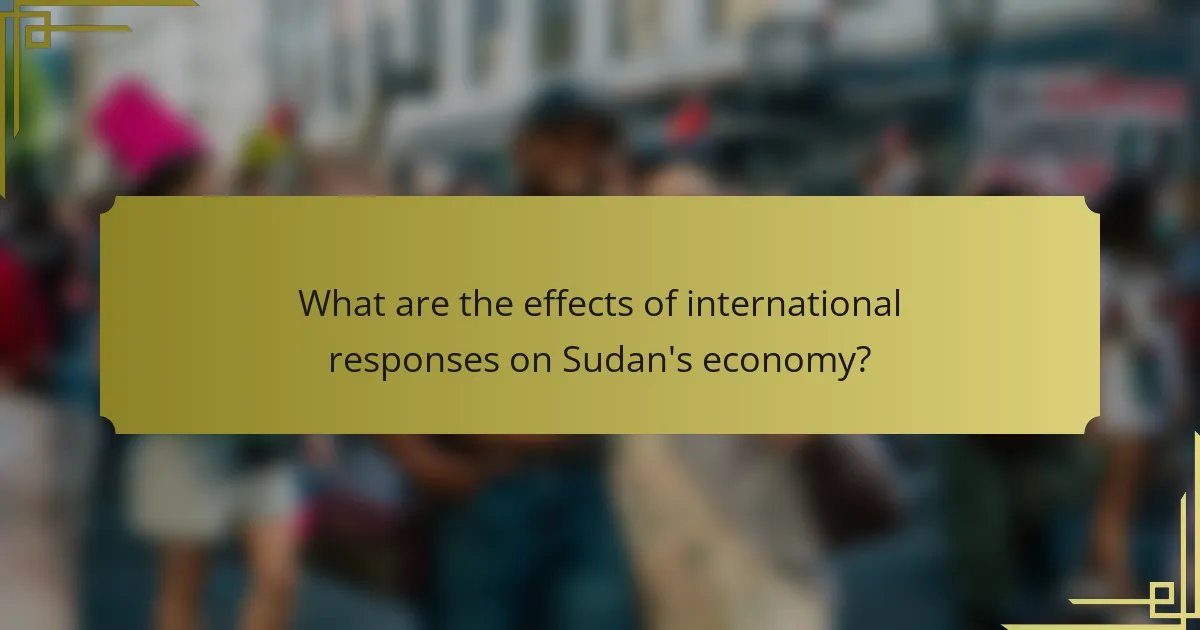
What are the effects of international responses on Sudan’s economy?
International responses have significantly impacted Sudan’s economy. Sanctions imposed by various countries have restricted trade and investment opportunities. This has led to a decrease in foreign direct investment, crippling economic growth. Additionally, international aid has fluctuated, affecting public services and infrastructure development. The withdrawal of foreign companies has resulted in job losses and increased unemployment rates. Moreover, the devaluation of the Sudanese pound has been exacerbated by these responses. Overall, international actions have contributed to economic instability and hardship for the Sudanese population.
How do these responses influence foreign investment in Sudan?
International responses to Sudan divestment policies significantly influence foreign investment in the country. Positive responses from international bodies can create a more favorable investment climate. For instance, easing sanctions can attract foreign investors seeking new opportunities. Conversely, negative responses can deter investment due to perceived risks. For example, continued sanctions may signal instability, leading to investor caution. Furthermore, international endorsements can enhance Sudan’s credibility, making it more appealing for foreign capital. Overall, the nature of international responses directly correlates with investor confidence and willingness to commit resources in Sudan.
What sectors are most affected by divestment policies?
The sectors most affected by divestment policies include fossil fuels, arms manufacturing, and tobacco. Fossil fuel companies face significant financial repercussions due to reduced investments. Arms manufacturers experience similar challenges as governments and institutions withdraw funding. The tobacco sector also suffers as health-focused divestment campaigns gain traction. These sectors are often targeted due to ethical concerns and social responsibility initiatives. For example, numerous universities and pension funds have adopted divestment strategies that impact these industries.
How does divestment impact local businesses in Sudan?
Divestment negatively impacts local businesses in Sudan by reducing access to capital and investment. When foreign investors withdraw, local businesses face financial instability. This leads to decreased economic activity and job losses. The withdrawal of investment often results in diminished consumer confidence. Local suppliers and service providers may struggle to find new clients. Additionally, divestment can lead to a decline in infrastructure development. This further hampers business operations and growth potential. Overall, divestment creates a challenging environment for local entrepreneurs and small businesses.
What are the long-term implications of international responses on Sudan’s political landscape?
International responses significantly shape Sudan’s political landscape over the long term. These responses can lead to increased pressure for democratic reforms. Sanctions and diplomatic actions may weaken authoritarian regimes. They can also empower opposition groups by providing them with international legitimacy. Moreover, international aid can influence governance and development policies. The involvement of foreign nations often shifts internal power dynamics. Historical precedents show that sustained international engagement can foster political stability. For instance, past sanctions against Sudan aimed to curb human rights abuses and promote democratic governance.
How do these responses affect governance and human rights in Sudan?
International responses to Sudan divestment policies directly impact governance and human rights in the country. These responses often lead to increased pressure on the Sudanese government to improve its human rights record. For instance, divestment actions can result in financial sanctions that limit the government’s resources. Limited resources can hinder the government’s ability to maintain control and enforce oppressive policies.
Furthermore, international scrutiny can encourage local civil society movements advocating for human rights. This can lead to greater public awareness and mobilization against human rights abuses. The involvement of international organizations also brings attention to human rights violations, pressuring the government to comply with international norms.
Historical context shows that divestment campaigns have previously influenced policy changes in Sudan. For example, the divestment movement during the Darfur conflict prompted some reforms in governance. Overall, international responses serve as a catalyst for potential improvements in governance and human rights in Sudan.
What potential changes could arise from sustained international pressure?
Sustained international pressure can lead to significant political and economic changes in Sudan. Increased diplomatic efforts may encourage the Sudanese government to adopt reforms. Economic sanctions can prompt changes in governance and human rights practices. Historical evidence shows that sustained pressure often leads to compliance with international norms. For instance, the 2011 South Sudan independence was influenced by international diplomatic efforts. Moreover, sustained pressure can result in increased accountability for government actions. This could involve international scrutiny of human rights violations. Ultimately, sustained international pressure can foster a more stable and democratic environment in Sudan.
What best practices can be adopted for effective international responses to Sudan divestment policies?
Effective international responses to Sudan divestment policies should include coordinated diplomatic efforts. Countries can align their policies to create a unified front against the issues prompting divestment. Engaging with international organizations can amplify pressure on the Sudanese government. Establishing clear guidelines for ethical investment can help direct resources towards responsible companies. Monitoring compliance with divestment policies is crucial for accountability. Transparency in reporting divestment actions fosters trust among stakeholders. Collaborating with NGOs can provide valuable insights and enhance advocacy efforts. These strategies collectively strengthen the impact of international responses to Sudan divestment policies.
The main entity of this article is “international responses to Sudan divestment policies.” The article provides a detailed examination of the measures taken by various countries and organizations to withdraw investments from Sudan due to human rights abuses, particularly in the context of the Darfur conflict. It explores the historical background of these policies, their objectives, and their impacts on international relations, Sudan’s economy, and governance. Additionally, the article discusses the roles of international law, NGOs, and specific actions taken by countries like the United States and European nations, highlighting the complexities of global attitudes towards Sudan and the potential long-term implications of sustained international pressure.
